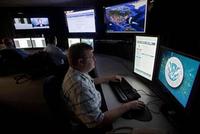-
Utilities increasingly aware of grid vulnerability
An analysis by the federal government shows that if only nine of the country’s 55,000 electrical substations were shut down due to mechanical failure or malicious attack, the nation would experience coast-to-coast blackout. Another report finds cybersecurity as one of the top five concerns for U.S. electric utilities in 2014. The report also found that 32 percent of the surveyed electric utilities had deployed security systems with the “proper segmentation, monitoring and redundancies” needed for adequate cyber protection.
-
-
SATCOMS vulnerable to hacking
Satellite communications systems (SATCOMS) used by soldiers on the front lines, airplanes, and ships are vulnerable to hacking, according to analyst Ruben Santamarta’s presentation at the recent Black Hatcybersecurity conference.While none of the vulnerabilities discovered could directly cause a plane to crash, or override pilot commands, they could delay or intercept communications, exposing security and classified information to bad actors.
-
-
Training cyber security specialists for U.S. critical cyber infrastructure
Lawrence Livermore National Laboratory is joining Bechtel BNI and Los Alamos National Laboratory to train a new class of cyber defense professionals to protect the U.S. critical digital infrastructure. The Bechtel-Lawrence Livermore-Los Alamos Cyber Career Development Program is designed to allow the national labs to recruit and rapidly develop cyber security specialists who can guide research at their respective institutions and create solutions that meet the cyber defense needs of private industry. About 80 percent of the nation’s critical digital infrastructure and assets are owned and operated by private industry.
-
-
Expanding the scope and impact of cybersecurity and privacy research
As our lives and businesses become ever more intertwined with the Internet and networked technologies, it is crucial to continue to develop and improve cybersecurity measures to keep our data, devices and critical systems safe, secure, private and accessible. The other day, the National Science Foundation’s (NSF) Secure and Trustworthy Cyberspace (SaTC) program announced two new center-scale “Frontier” awards to support large, multi-institution projects that address grand challenges in cybersecurity science and engineering with the potential for broad economic and scientific impact.
-
-
SWAMP: Improving software assurance activities
The Software Assurance Market Place, or SWAMP, is an online, open-source, collaborative research environment that allows software developers and researchers to test their software for security weaknesses, improve tools by testing against a wide range of software packages, and interact and exchange best practices to improve software assurance tools and techniques.
-
-
The smart grid offers convenience, but it also makes cyberattacks more likely
Recent efforts to modernize the electric grid have increased communication between utilities and consumers, enhanced reliability, and created more opportunities for green energy producers; but it has also elevated the risk of cyberattacks. Proposed smart grids rely on technology that has created millions of new access points; and though more access points within the grid allows renewable energy generators to supply utilities, they also present opportunities for hackers to breach the system.
-
-
Chinese government hackers collected information on U.S. security clearance applicants
Chinese government hackers last March broke into the computer networks of the U.S. Office of Personnel Management, the agency which keeps the personal information of all federal employees. The hackers targeted the information of tens of thousands of employees who had applied for top-secret security clearances. Experts note that the hacking of OPM files containing information about federal employees applying for security clearance is especially disturbing since federal employees applying for security clearances enter their most personal information.
-
-
Leaked documents reveal law enforcement hacking methods

Through the sourcing of a leaked documents cache from the Italian firm Hacking Team, members of the University of Toronto’s Citizen Lab have revealed the methods of law-enforcement hackers. While much of Snowden’s revelations concerned broad international surveillance, documents from Hacking Team reveal more specific methods such as the actual techniques for tapping phones and computers to operate as eavesdropping devices.
-
-
Syrian Electronic Army’s attack on Reuters makes a mockery of cyber-security (again)

One big security issue that has arisen lately concerns control of news media. National boundaries have become blurred on the Internet, and the control any nation can have over information dissemination has been eroded — on news Web sites but especially on open platforms such as Twitter and Facebook. One lesson from all the attacks on open platforms is that a focus of any attempted hack will be a spear phishing e-mail. Tricking users into entering their details may be simple, but it can be very serious. For example the Reuters site, which was attacked by the Syrian Electronic Army (SEA), a pro-Assad group of “hacktivists,” integrates more than thirty third-party/advertising network agencies into its content. A breach on any of these could compromise the agency’s whole infrastructure.
-
-
DHS receives top FISMA score for the second year in a row
DHS has received the top score in the annual Federal Information Security Management Act (FISMA), making it the only agency to achieve a score of ninety-nine two years in a row. The act, passed in 2002, requires the Office of Management and Budget to report on federal agencies’ implementation of set processes designed to secure federal IT infrastructures.Analysts credit the achievement to DHS’ Office of Inspector General’s (OIG) push for continuous monitoring of IT systems and standards. The OIG uses commercial vulnerability scanning tools and open source management software to form a system that routinely scans the agency’s networks for compliance with FISMA metrics.
-
-
Is Facelock the password alternative we’ve been waiting for?

One of the problems with using passwords to prove identity is that passwords that are easy to remember are also easy for an attacker to guess, and vice versa. Nevertheless, passwords are cheap to implement and well understood, so despite the mounting evidence that they are often not very secure, until something better comes along they are likely to remain the main mechanism for proving identity. But maybe something better has come along. Researchers propose a new system based on the psychology of face recognition called Facelock. But how does it stack up against existing authentication systems? The idea certainly sounds interesting and the technical challenges in implementing such a system do not seem great. But there are difficult questions regarding cost, selection and security of images that need to be answered before it becomes a practical alternative to passwords.
-
-
Research identifies Android security weaknesses caused by performance design
Researchers have identified a weakness in one of Android’s security features. Their research, titled Abusing Performance Optimization Weaknesses to Bypass ASLR, identifies an Android performance feature that weakens a software protection called Address Space Layout Randomization (ASLR), leaving software components vulnerable to attacks that bypass the protection. The work is aimed at helping security practitioners identify and understand the future direction of such attacks.
-
-
“Marked ghost imaging” offers enhanced security for data storage, transmission
“Ghost imaging” sounds like the spooky stuff of frivolous fiction, but it is an established technique for reconstructing hi-res images of objects partly obscured by clouds or smoke. Now researchers are applying the same idea in reverse to securing stored or shared electronic data. Their work establishes “marked ghost imaging” technology as a new type of multi-layer verification protocol for data storage or transmission.
-
-
Shortage of cybersecurity professionals a risk to U.S. national security
The nationwide shortage of cybersecurity professionals — particularly for positions within the federal government — creates risks for national and homeland security, according to a new RAND study. Demand for trained cybersecurity professionals who work to protect organizations from cybercrime is high nationwide, but the shortage is particularly severe in the federal government, which does not offer salaries as high as the private sector.
-
-
Security flaw: Researchers find thousands of secret keys in Android apps
Researchers have discovered a crucial security problem in Google Play, the official Android app store where millions of users of Android, the most popular mobile platform, get their apps. “Google Play has more than one million apps and over 50 billion app downloads, but no one reviews what gets put into Google Play — anyone can get a $25 account and upload whatever they want. Very little is known about what’s there at an aggregate level,” says one of the researchers.
-
- All
- Regional
- Water
- Biometrics
- Borders/Immig
- Business
- Cybersecurity
- Detection
- Disasters
- Government
- Infrastructure
- International
- Public health
- Public Safety
- Communication interoperabillity
- Emergency services
- Emergency medical services
- Fire
- First response
- IEDs
- Law Enforcement
- Law Enforcement Technology
- Military technology
- Nonlethal weapons
- Nuclear weapons
- Personal protection equipment
- Police
- Notification /alert systems
- Situational awareness
- Weapons systems
- Sci-Tech
- Sector Reports
- Surveillance
- Transportation
Advertising & Marketing: advertise@newswirepubs.com
Editorial: editor@newswirepubs.com
General: info@newswirepubs.com
2010-2011 © News Wire Publications, LLC News Wire Publications, LLC
220 Old Country Road | Suite 200 | Mineola | New York | 11501
Permissions and Policies
Editorial: editor@newswirepubs.com
General: info@newswirepubs.com
2010-2011 © News Wire Publications, LLC News Wire Publications, LLC
220 Old Country Road | Suite 200 | Mineola | New York | 11501
Permissions and Policies
